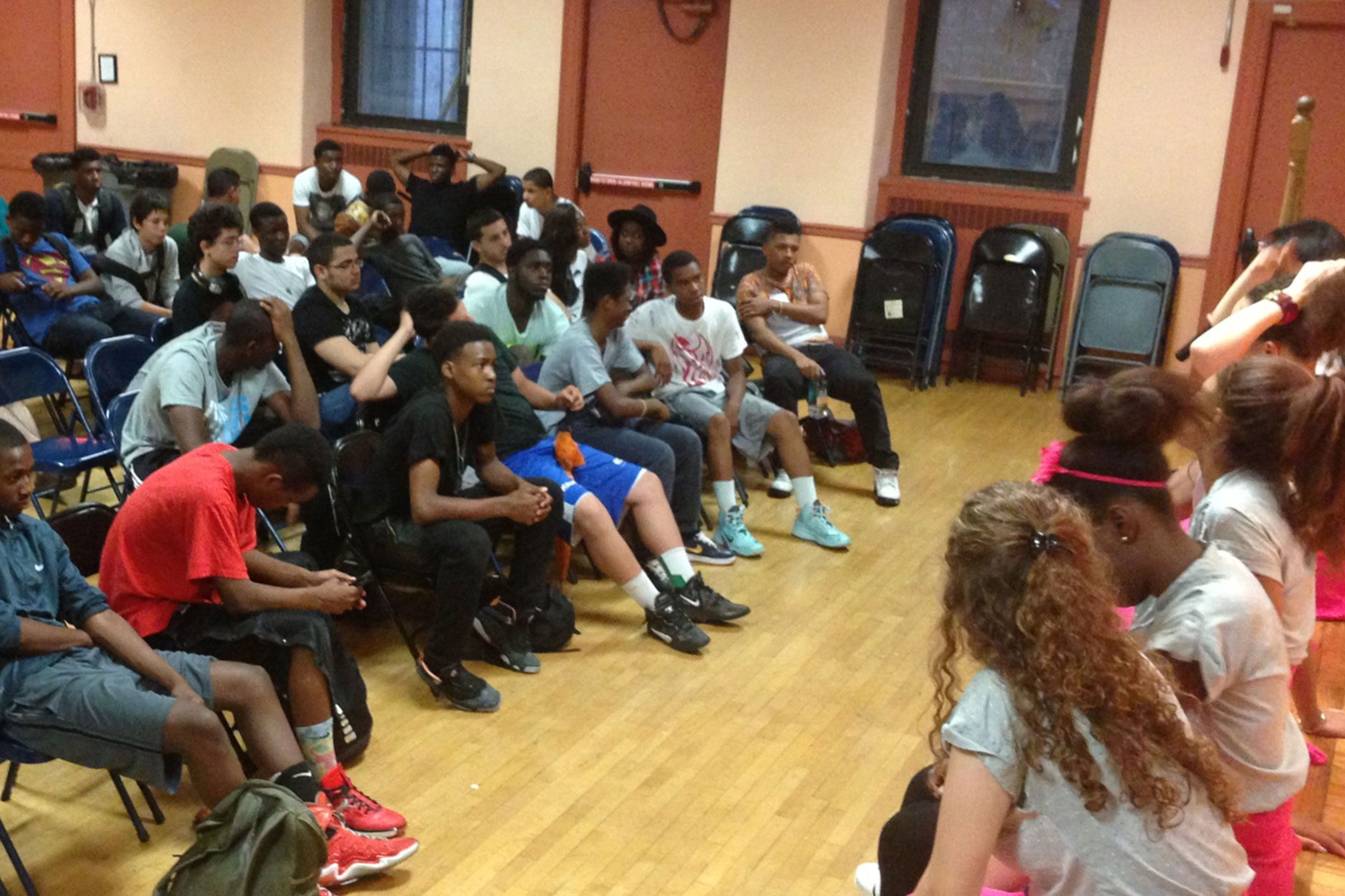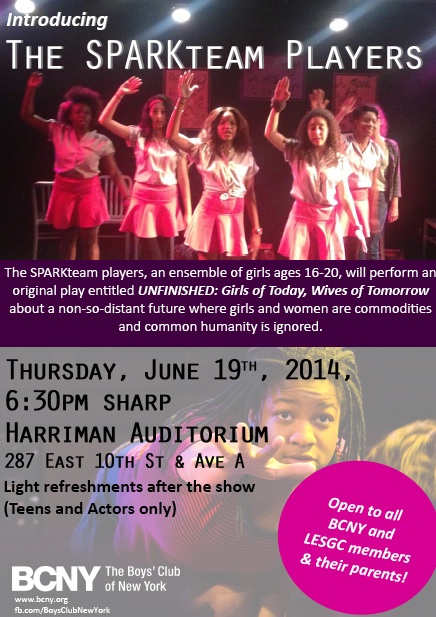In the winter and spring of 2014, we produced UNFINISHED: Girls of Today, Wives of Tomorrow, an original play with songs and dances written and performed by the ensemble. The show was performed three times at the Playroom Theater in Midtown Manhattan, once at the New York University School of Law in partnership with NYU’s Project for Advancing our Common Humanity and once at the Boys Club of New York for a diverse audience of approximately 350 people. Following all performances were moderated discussions about the themes and content of the show and a community strategizing session about how to take action personally and locally. Following the run of the show, SPARKteam members created a detailed curriculum that included performance-based, writing and activist activities for educators to use along with a video of the production.



Rehearsal and Production Process
SPARK began the recruitment process in early 2014 in order to find and select an ensemble of diverse girls to participate in our writing and performance project. We pitched the project through our network of teachers, educators and activists in public high schools throughout New York City and online through social media to reach people at community-based organizations that work with girls. We held tryouts which included an interview, a short performance and a group devising project. We selected an ensemble of six teenage girls ranging from fourteen to eighteen years old from public and independent high schools and New York University.
We rehearsed intensively for approximately 75 hours over six weeks. Rehearsals included media literacy education where we analyzed media representations of girls and women in television, movies and print advertisements, popular culture, music videos and music lyrics. We discussed sexual violence and its root causes. We talked about the rigid constraints men and women are forced into in order to comply with social norms regarding masculinity and femininity and the ways these constraints can lead to insecurity, shame, rage and violence. The girls shared personal stories about street harassment, body hate, sexual violence, peer pressure, dating, “slut shaming” and self-sexualization. The girls articulated their frustrations and anger about the ways in which girls and boys are represented in the media and the ways those images impact the ways they interact in school. And most importantly, we then strategized how to create text and storylines that present alternatives, and guide audiences to take action and advocate for change.
The girls invented a detailed narrative and collaboratively wrote the full script including three original songs. The play took place in the not-too-distant future at a “Finishing School for Girls,” where girls were sent in order to learn how to be the “perfect wife.” They explored and exploited common stereotypes about forced, exaggerated femininity and masculinity and then showed the impact on girls’ and boys’ lives. In a humorous scene where all the girls transform into male characters, they illuminated the pressures that boys face and they articulated the ways in which young people are forced to follow strict gender rules that dictate women’s passivity and men’s aggressiveness. The play allowed the audience to see how these restrictive gender roles lead the way to increased violence against women and girls.
On May 28- 31, and June 19, 2014 we performed the play with lighting, sound, music and costumes. We invited a local activist organization to set up a table with information in the lobby of the theater to engage the audience before and after the performance. Girls for Gender Equity provided information and resources about strategies to prevent street harassment.
Community Engagement
Every performance was filled with energized, enthusiastic audiences. We received standing ovations at four of our five shows. Our incredibly diverse audiences included more than just the friends and families of the performers. We partnered with several local youth organizations and they brought groups of teenagers of color. Our NYU performance included mostly university professors, scholars, graduate students, professional artists and activists and our performance at the Boys Club was filled with nearly 100 teenage boys of color from lower Manhattan.
As part of the narrative of the play, the girls escape from the finishing school and rush towards the audience. Staying in character, they directly address the audience and facilitate a dialogue where they ask members of the audience to help them understand what life is like in the world today. They invite the audience members to share stories about how gender stereotypes impact their lives and then they demand that the audience think about how to take action and change things. Each night, audience members shared personal stories about the pressures and stress they face related to gender. Young women spoke about the pressure to be thin, the pressure to be quiet and silent, and the pressure to please boys. And young men shared stories about the pressure to hold their emotions inside and the pressure to always act tough and aggressive. We discussed how these pressures lead to increases in violence against women and girls and then audience members offered strategies for how they can make changes in their own lives and communities.

Here’s a short excerpt from the script:
CLARA
No, really. You say that women have to be independent but also dependent. So Marilyn’s face and body is all over billboards and bedroom walls. And what does she get? She gets called a loser, a slut, weak. “Well then fine,” she said. “Hell, I’ll show them independence.” And she killed herself! Is that where we’re all headed?
PLEASANT
Clara, you’re framing what we’re being told as a double-standard. Understand, double-standards are what allow society to function, to thrive!
CLARA
But what about us, Pleasant? What about me? What about what I want? What if I don’t want bake exotic plum cakes to get my dose of creativity for the evening?
PLEASANT
(Agitated) Clara. You think everything is so rosey, rosey? You’ve seen men. They are big. They are large things. They have hormones in them that just are simply not intended to uphold the things that we must.
CLARA
But don’t you think, if we’re told that from day one, that we start believing it? That maybe if we didn’t hear that, things could be different? That men could care. That women could lead. That there could be no masculinity, or femininity, that we could all just exist as imaginations, dreams, raw material, just aching to be churned out into something beautiful? (Turning to everyone) What do you guys want?
SASSY
To design.
KELLY
To create.
PENNY
To scribble.
BRANDY
To dazzle.